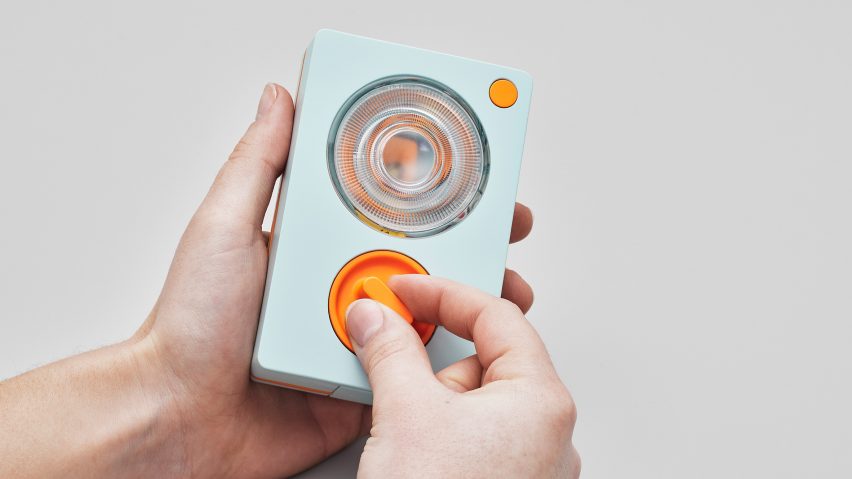Design studio Pentagram has partnered with social enterprise Ambessa Play to create a DIY flashlight that will be sent to children in refugee camps.
The Ambessa Play flashlight can be assembled from a kit of parts that is designed to be easy for kids to handle while teaching them about science and electricity.
The social enterprise brought in Pentagram partner Jon Marshall to develop the industrial design of the flashlight, which has a colourful and tactile appearance both inside and out.
Marshall and his team aimed to give the flashlight a distinctive, fun design that would suit Ambessa Play's one-for-one business model. For every kit purchased, another just like it will be delivered to a displaced child out of school.
The flashlight operates on a battery-free wind-up mechanism, and it has a flat, wallet-sized shape that Marshall told Dezeen was chosen through workshops with children in refugee camps where they could test functional 3D prototypes.
The workshops were organised through partnerships with the Refugee Council and other charities, which allowed Pentagram and Ambessa Play to regularly meet with their target audience throughout the design process.
"We developed about six to eight initial concepts for the external form, including standard cylindrical torch shapes," said Marshall.
"Children actually made the decision for us on the final design. They chose the flat rectangular form because it was the most compact and they liked that it fits into a pocket."
"They also remarked that this design allowed the flashlight to function as a handheld torch but could be placed upright shining onto the table surface like a lantern for reading," he added.
The finished flashlight also has a lanyard so it can be worn around the neck. It can be wound up using a clip-on hand crank for fast charging, or with that removed, by using the dial on the front to keep the device topped up.
The winding charges a capacitor, which was chosen to keep the design compact and avoid the safety issues of batteries. According to Ambessa Play, one to two minutes of winding creates enough energy to power the LED lamp for around 15 minutes.
For the internal components, the Pentagram team focused on creating attractive tactile details while simplifying the layout for ease of assembly. There are 10 components overall and 16 build steps.
"Much of our prototyping revolved around the development and refinement of the build steps for electronic components in order to strike a balance between simplicity of assembly and learning about the components," said Marshall.
"We also took a lot of care with the layout and grouping of the components to make the design graphically pleasing, not just for aesthetics but to translate the design easily to the printed build instructions," he added.
The coloured, keyboard-key-like cable connectors are a bespoke design, created when off-the-shelf options proved too difficult for children to use during testing.
"It was probably the most technically challenging aspect of solving the design," said Marshall.
The flashlight's casing is made of ABS plastic, which Marshall says was chosen because it is robust and long-lasting, suiting a product designed for repair and longevity.
The flashlight kit is the first product from Ambessa Play, which was founded by tech worker Sara Berkai. The social enterprise plans to deliver the kits to children in camps themselves, via workshops conducted with their existing partner charities.
Pentagram is an international design studio currently run by 22 equal partners who come from different areas of design. Marshall, who is based in the London office, has been a partner since 2018.
He has previously worked on the industrial design of a number of STEM learning kits and interactive toys, including the Yoto screen-free audio player and the Pigzbe cryptocurrency wallet.

